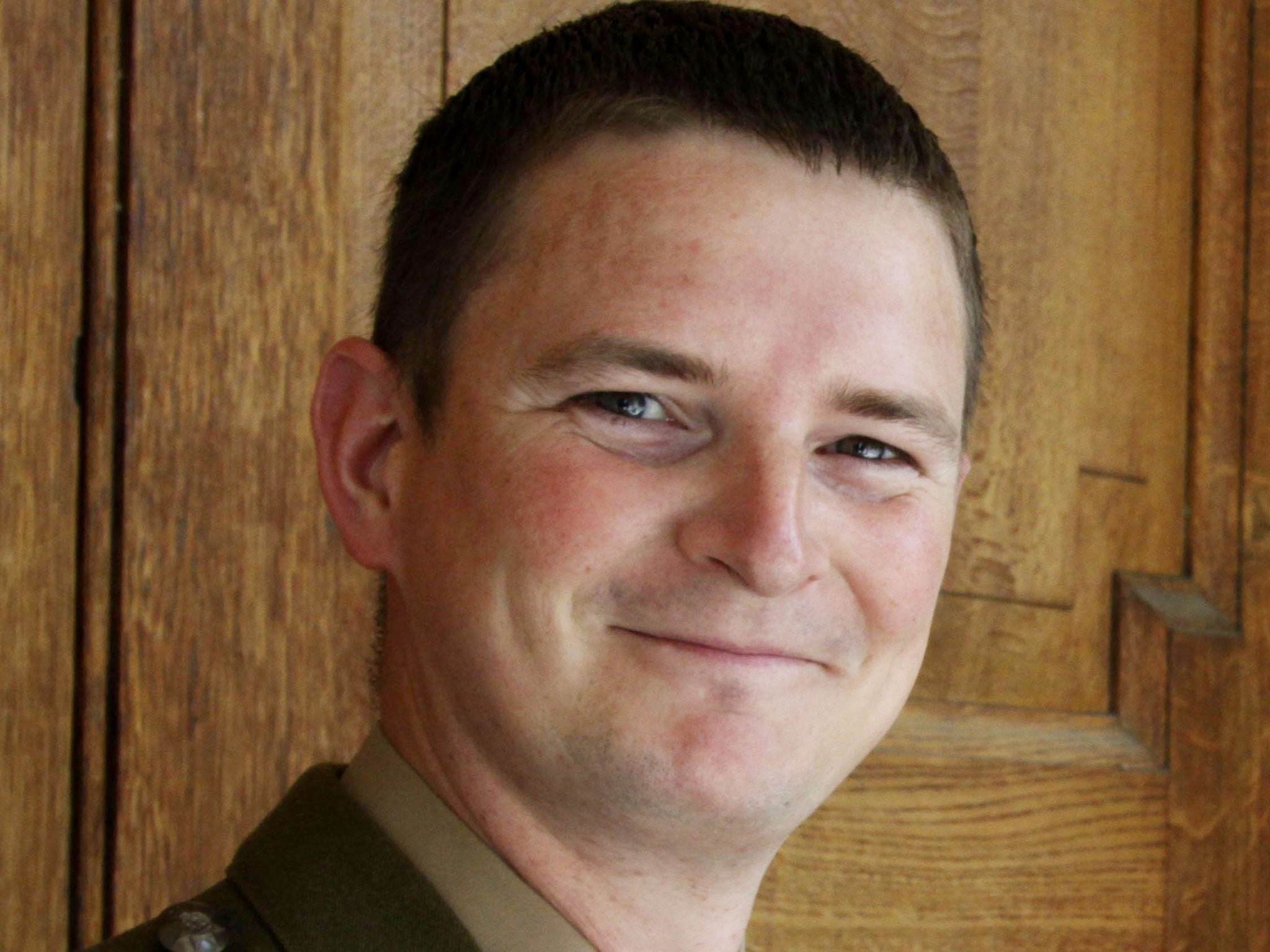Jailed soldier's family accuse Army of 'betrayal' over combat trauma
Corporal who stole a rifle should have been given help when he returned from Afghanistan, says father

The family of a soldier facing up to 10 years in jail for stealing a rifle have accused the Army of betraying their son who they say is suffering from combat trauma after serving in Afghanistan. The family of Corporal Harry Killick say he took the weapon to kill himself, and blame the military for ignoring clear warnings that he was suffering from severe post-traumatic stress disorder following more than a decade of service abroad.
The sister of Cpl Killick says the father of two feels "betrayed" by the Army, who have "washed their hands" of him. Relatives say the 36-year-old Territorial Army soldier has been "let down" by the level of care he has received for the traumatic flashbacks he experiences from his time serving in Afghanistan in which he witnessed the death of comrades in combat.
Experts warn that there is growing evidence that safeguards designed to identify and help soldiers suffering from combat stress before they harm themselves or others are inadequate to cope with the strains caused by fighting in Afghanistan and Iraq. A Manchester University study recently found soldiers are three times more likely to take their own lives than civilians.
Last week, Cpl Killick pleaded guilty to theft of a gun, theft of one round of ammunition, and possession of a prohibited weapon. Hove Crown Court heard that a more serious charge of possession of a firearm with intent to cause fear of violence Ω which carries a life sentence Ω would be dropped.
Cpl Killick was arrested in October at the Brighton home of his ex-partner and charged with the theft and possession of a rifle, taken from his local TA barracks. Evidence before the court makes clear that the soldier's former wife had telephoned the barracks to express her concern about Cpl Killick's behaviour. She said during one visit he had given her his car keys and bank cards and told her he would not be seeing her or his two children again.
Colleagues who served with him are also understood to have expressed concern at his mental health after he returned from Afghanistan with the Princess of Wales's Royal Regiment. There are reports of his repeatedly watching combat footage shot on his helmet camera, where a colleague dies in an explosion. Other witnesses said his behaviour had become clearly depressed.
Army welfare officers at his barracks are believed to have been sufficiently worried to recommend him for trauma assessment but did not get him an appointment. They stopped him from going on a live-firing exercise but assigned him a job issuing the weapons and ammunition to fellow soldiers. It was at this point Killick admits taking an unsecured weapon that had been issued to a sergeant. He also took a single round of ammunition which had been lying loose in a store room.
He was later arrested by police at the home of a former girlfriend, where he had gone to ask her a question. The woman was not at home and at no point was Cpl Killick seen to raise the weapon in a threatening manner. He has been placed on suicide watch in the prison where he is being held prior to sentencing.
Now his family have launched a campaign to get urgent medical professional help and raise awareness of the seriousness of PTSD among territorial soldiers. The Facebook campaign, which has attracted more than 1,400 supporters, also seeks to identify Cpl Killick's condition as a mitigating factor. They say he has already been diagnosed with severe PTSD by a prison psychiatrist and his mental health is rapidly deteriorating. He will be assessed by a court appointed PTSD specialist next month, before sentencing.
"Harry took life in his stride, he was proud of what he did. Now he is withdrawn and terrified. Every noise in prison takes him back to the traumas he experienced in the Army; he's in the wrong place", says his father, Mick, 73.
His sister, Linda, said yesterday she was "shocked" and "frightened" by her brother's condition, after a prison visit. He says he "cannot understand why the Army he served has abandoned him". His father has questioned why the family has "not received one phone call from the Army" to enquire into his son's wellbeing, or "answered a number of questions regarding why [Cpl Killick's] mental illness was not dealt with earlier".
Cpl Killick joined the TA in 2008 after serving five years in the Parachute Regiment, including tours of Northern Ireland and Bosnia. After returning from a six-month tour in Afghanistan in October 2011, his family say he was sent immediately to Cyprus to "train other troops" while he should have been on military decompression. On returning to the UK, Killick told a military psychiatric nurse he was struggling to deal with the traumas of his tour.
Shortly before his arrest, Cpl Killick had been nominated for a Lord-Lieutenant's Award for his "meritorious service" – a nomination the family say has now been withdrawn. Linda Killick says: "I really didn't think the Army treated people like this, he has put his whole life into what he did, he went to Afghanistan and he was proud to go. I feel let down, disgusted. We haven't even had a call from them. No contact at all. It doesn't just affect Harry, it has affected the whole family."
Join our commenting forum
Join thought-provoking conversations, follow other Independent readers and see their replies
Comments